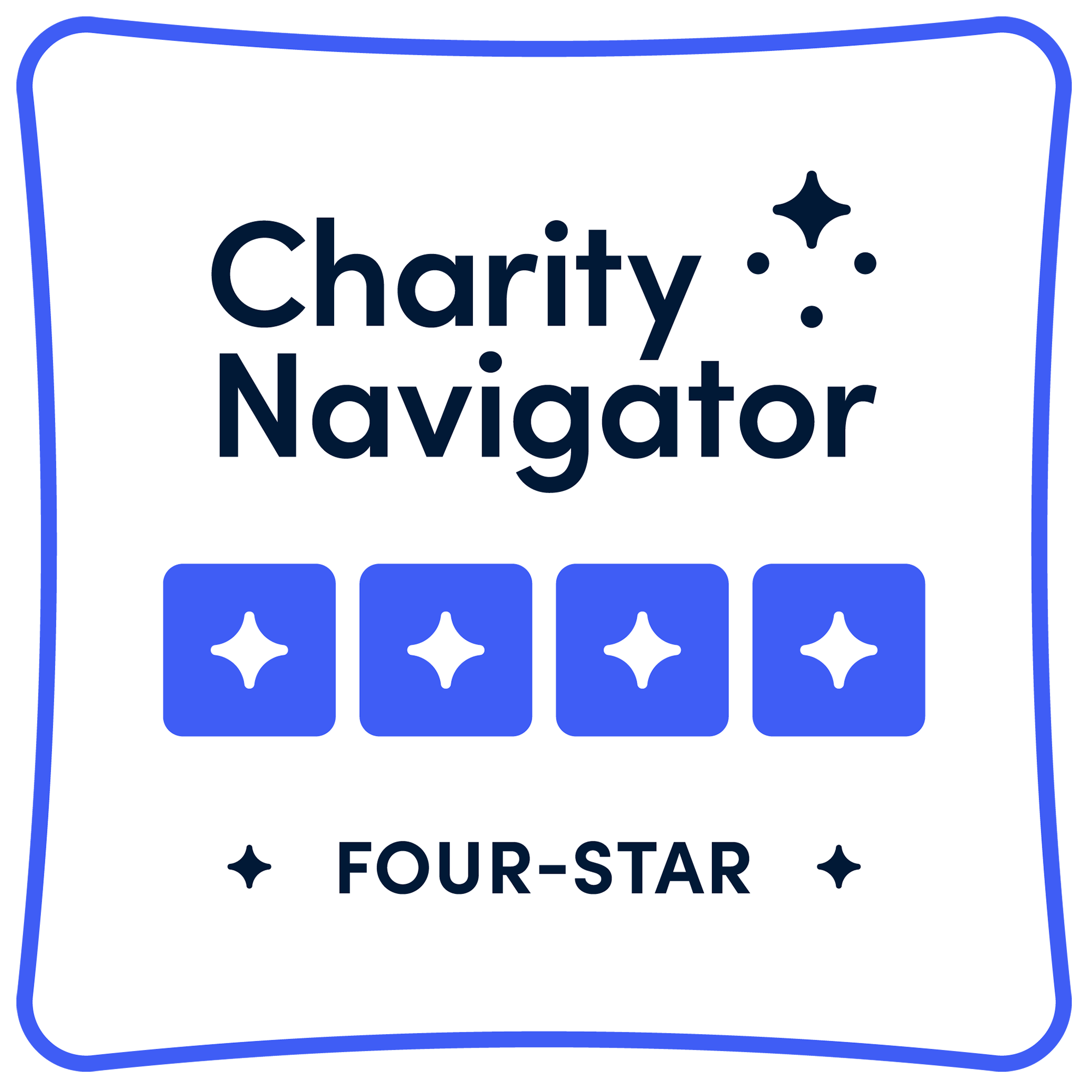Client Stories
In Their Own Words
Our clients inspire us every day with their tireless determination, hard work, and resiliency. These are just a few of the faces of LifeMoves and their experience returning to homes of their own.
I Can Be a Father Now, Not a Homeless Ex-con
I’m no longer an addict. I’m no longer homeless. I’m no longer incarcerated. I’m achieving my goals and being a dad again.
Video Stories
Written Stories
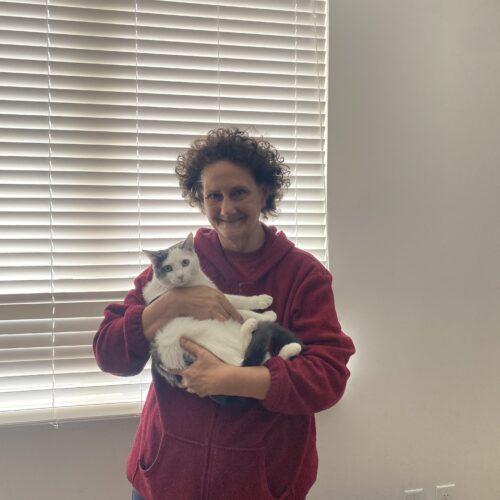
It started when her husband, a Vietnam veteran, began experiencing seizures due to exposure to Agent Orange. The battle for his disability benefits was arduous, stretching their finances thin. They found themselves living in a long-term hotel for nearly a decade, clinging to each other for support.
The long-term hotel was closed shortly after and was followed by the tragic passing of Jill’s husband in 2022. Jill felt lost and alone. She navigated the complex system of shelters and services to try and find housing. She ended up at a shelter in South San Francisco for about a month before being transferred to the San Mateo County Navigation Center, which is operated by LifeMoves.
At the Navigation Center, Jill accessed vital services, including care from the dental van and the on-site primary care doctor. She received a recommendation for an emotional support animal from the doctor, leading her to adopt Mercury, the rescue cat who became her faithful companion.
Life for Jill was still challenging, as she missed her husband terribly, and the constant uncertainty weighed heavily on her. Yet, despite the struggles, she remained hopeful. She continued to access primary care for herself and Mercury.
HIP Housing, a non-profit which provides housing and home sharing services in San Mateo County, eventually reached out to Jill. They offered her a place to call home in October 2023, and she couldn't believe her luck. Moving into a new apartment felt like a fresh start and a chance to continue her life on more stable ground.
As she reflected on her journey, Jill couldn't help but feel grateful for the support she received from LifeMoves, and for having Mercury there with her. The little cat had been her constant companion through the darkest of times, offering comfort and companionship when she needed it most.
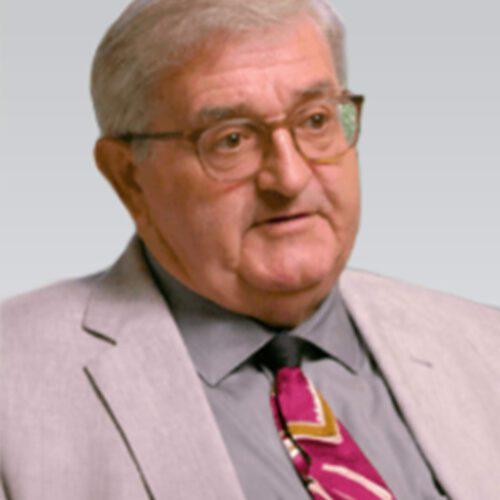
Steven was sucked into that culture. He lost his job, his marriage, and his home.
That’s when he started living in his car, drinking whiskey. “I always thought, ‘Tomorrow I’ll be the captain of industry again,’ me, a person who hasn’t showered in six, seven months, a beard down to here. It was just the delusion that alcohol gives you.”
An alcoholic seizure put him in the hospital. “I literally had nothing, a pair of sandals and a pair of sweats,” he remembers.
“I had no self-esteem, I had no dignity, and I had a sickness,” he said.
But at LifeMoves’ Maple Street, he changed his life.
“On day one, they said, ‘you have a sickness and we’re here to help.’ They treated me with extreme dignity. I wasn’t a homeless person anymore. I felt like there was hope.”
After achieving sobriety, he wanted to help other people. For 12 years, he has been a counselor — working with LifeMoves and the San Mateo police — helping others like himself.
“I walked into a homeless shelter scared to death, now I have my dream job.”
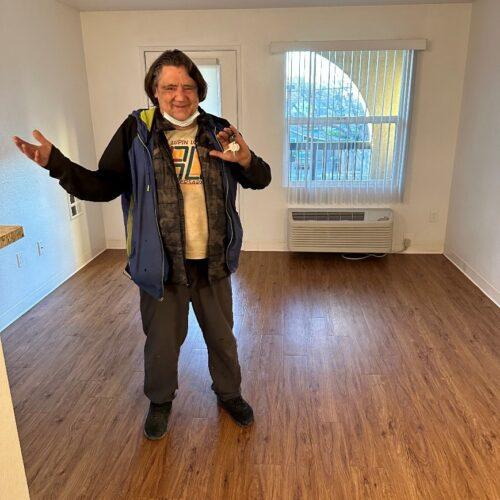
Unfortunately, Matthew was no stranger to unstable housing. Despite owning his own business as a general repair person, he had not had his own place in over a decade, couch surfing and renting rooms when he could.
“I’m college educated and have 40+ years’ experience in automotive repair, construction, plumbing and computer and electronics. But the cost of being self-employed is astronomical, with taxes and city permits. My income fluctuated quite a bit. There were times I couldn’t even afford the gas to get my truck to a customer’s location,” he says.
Finding stable and secure housing became even more difficult after Matthew suffered a stroke and multiple serious medical diagnoses. He could no longer work at his physically demanding job.
“Even though these life-threatening conditions are under control and I’m not in immediate danger, they are chronic and severely limiting. Most physical activities cause immediate and severe fatigue. Between that and my age (61), finding work I’m qualified for is next to impossible,” says Matthew.
After meeting Matthew at the Columbus Park homeless encampment, Alexandra, a LifeMoves Housing Specialist, worked diligently to find Matthew affordable housing. Matthew qualified for the Rapid Rehousing subsidy for rental and deposit assistance.
The lease signing took place in January of 2023. Matthew was so excited he arrived two hours early. Alexandra also worked with the Bay Area Furniture Bank to provide furniture for Matthews’s new home. As part of the LifeMoves program, Matthew continues to receive support from his case manager around budgeting.
Matthew remains grateful for the assistance he received from LifeMoves, and especially the support and advocacy he received from Alexandra.
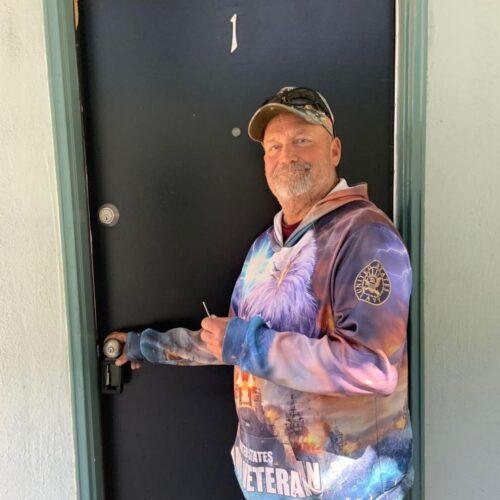
Robert came to MSI and accessed every available service to him. From getting his identification at the DMV to managing his new bank accounts and social security, he navigated these mazes with determination and help from his case manager, Sylvia. Dialysis was also a routine part of his life, and the MSI staff arranged transportation for Robert to and from treatment three days a week. To account for an old injury, Sylvia helped him get a brand-new scooter through the VA, just in time for his birthday. Robert often attended one-on-one and group therapy sessions, offering him a semblance of peace amidst the turmoil of his past.
After first arriving at MSI, Robert admitted he had a "bad attitude," reflecting on his initial hesitancy to accept assistance. This partly stemmed from being in disbelief about his situation. With encouragement from Roxanne, MSI's program director, he could begin to see things differently. She saw beyond his tough exterior, recognizing him as a fun-loving spirit people enjoyed and wanted to be around.
Towards the end of his stay at MSI, he took a pivotal step towards independence. With support from LifeMoves, he transitioned to a housing complex through the Veteran's Affairs Supportive Housing program (VASH). Unfortunately, he experienced a setback when an illness landed him in the hospital for over a month. During this time, Sylvia, his dedicated case manager, visited him regularly,going above and beyond to ensure his needs were met.
After this, he returned to his apartment and was surprised when the program director and associate program director showed up at his new place with furniture. Together, they furnished his new home, marking a fresh chapter in his life. The support he received from the LifeMoves staff, especially his case manager, Slyvia, left a lasting impact on him.
As he settled into his new home, Robert reflected on his journey with gratitude. "I had a great relationship with all of them at the site. MSI will always be in my heart," he remarked. Despite the challenges of adjusting to civilian life, he found solace in his newfound independence and the support of those who stood by him.
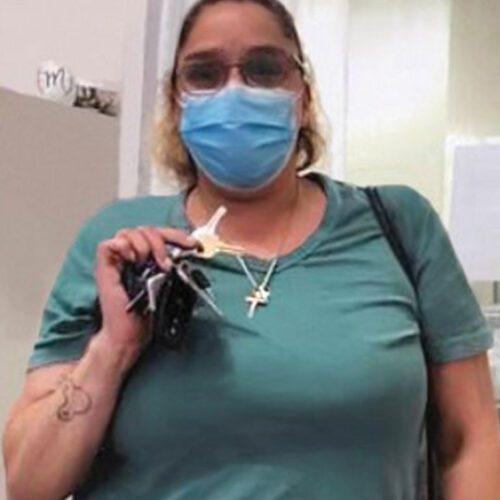
Tammy wasted no time in her pursuit of improved circumstances. With determination and the assistance provided by LifeMoves, she greatly improved her credit score, and secured a higher-paying job with more favorable hours, giving her a solid foundation to rebuild their lives.
Her son's journey was more intricate. With an IEP (Individual Education Plan) in hand, his educational and social needs require careful attention. Through the TAP-In Tutoring program, his academic abilities soared, earning him over $100 in incentives. Transportation hurdles were overcome, ensuring his regular attendance, and provisions were made for independent study when transportation faltered. Additionally, he received invaluable one-on-one teen therapy services through LifeMoves.
As they navigated their challenges, Tammy and her son found a sense of belonging within the Villa community. With the support of fellow residents, they tackled obstacles head-on. Within a mere three months, they had not only regained their confidence but also accumulated savings substantial enough to secure their own home.
Nearly two years after their departure from LifeMoves, Tammy and her son continue to thrive in the same apartment. Tammy now serves as a property manager for the company that owns her unit, and she personally oversees five properties.
"LifeMoves fueled my determination because going back is not an option," Tammy affirmed. "Taking a leap of faith is what LifeMoves taught me," she added, reflecting on the organization that extended a helping hand when she needed it most.
Meanwhile, her son faced his own struggles, grappling with depression following the anniversary of his father's passing. However, with resilience and support, he's excelling academically, earning A's and B's, forming friendships, and enjoying school.
Through it all, his IEP remains a valuable tool, continuing to guide and support his educational journey.
Tammy proudly holds up a set of keys, as shown in the picture, and reflects on how far they've come. These keys, which are the same set that she currently has today, represent her resilience, determination, and the unwavering belief that a brighter future is always within reach.

Everyone carries a compilation of life experiences that impact their life and world views. Daniel's journey is full of challenges, starting in childhood and spanning almost 30 years, but his story is also full of hope.
"We all have a story. Mine included alcoholism, incarceration, running away, losing a spouse, and abusive relationships. Now, I just want to live my life normally, and I'm grateful for the support from LifeMoves, especially from my case managers. Vanessa is confident in me, which means a lot," says Daniel.
Daniel is in his mid-40s, and his story is one of courage and resilience. It began with a challenging childhood, resulting in PTSD and severe anxiety. Holding down a job was difficult, and when his wife of 20 years died in 2016, Daniel not only lost her support but also the home they shared.
He moved in with a friend.
"But the environment was unhealthy for me," he says. "He had serious health issues and was using drugs, and I was the caretaker. It wasn't working."
In mid-2023, Daniel made the courageous decision to walk away and found himself at a Salvation Army shelter. A month later, he moved into one of the LifeMoves sites.
Vanessa, Daniel's case manager, explains that he was very quiet and kept to himself at first. She stressed the importance of opening up and asking for support. Vanessa was also instrumental in encouraging Daniel to take advantage of the LifeMoves programs, especially those supporting mental health.
LifeMoves offers therapy to clients and in Daniel’s case, also supported a neuropsychologic assessment, to test brain function and provide Daniel and his support team a better understanding of his behavior.
"I was scared out of my mind to share," says Daniel. "But Vanessa worked with me closely, and I've gotten more comfortable." And Vanessa is excited about his progress. "He's grown so much. He knows that help is here, and that it is safe to ask for support."
While Daniel's challenges around anxiety haven't gone away, his confidence is growing, and he is hopeful about the future.
Daniel has since been housed with the assistance of his case case manager, Vanessa.
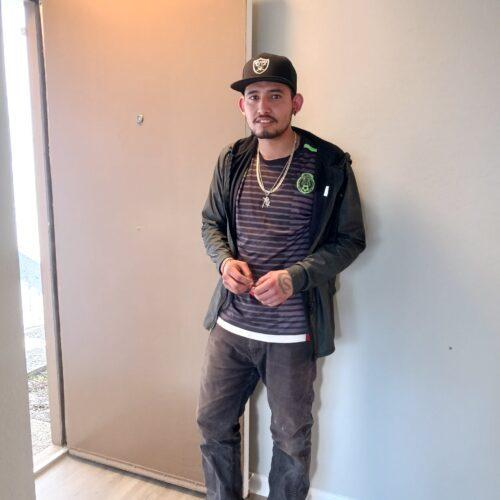
Pacifica Resource Center was doing outreach in the Half Moon Bay area and convinced Victor to go into interim housing, and he found himself at LifeMoves.
Victor began working on his mental health with the Mental Health Association but was not ready to trust anyone or engage in any other services. For the first three months, he did not physically stay at the LifeMoves site but would check in with his Case Manager daily without fail. “I had been through so much with my family that I could not trust anyone. I felt I couldn’t ask for help because I didn’t deserve it. If my own parents didn't want to guide and support me, why would anyone else?” Said Victor.
He grew despondent and resigned to return to the creekside encampment and find a way back to Mexico and his grandparents. Elisa, his case manager, pleaded with him not to return to the encampment. She offered to get him back to Mexico but insisted he would need his documentation. Elisa commented, “once he had his identification and social security card in hand, something clicked, and he started asking for help and driving his life forward".
My Case Manager was there for me all those months and helped me see that there could be another path.” Said Victor.
He asked for help, got online, started looking for housing, and enrolled in a training program with Vocational Rehab Services, where he was learning job skills and English. At 24, Victor is now housed and employed in Pacifica.
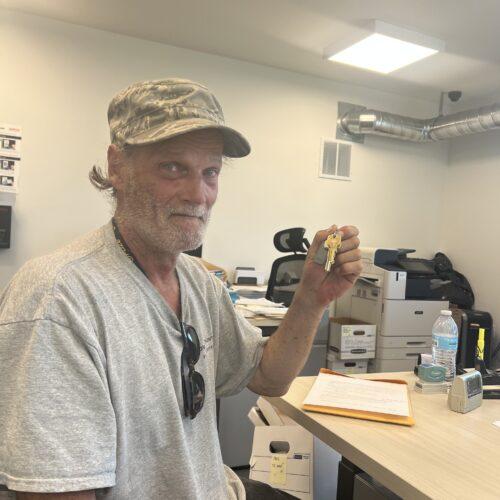
After losing his wife, Clarence battled homelessness for years, grappling with his sobriety along the way. His journey to recovery began when he connected with LifeMoves partner IMAX, who specializes in recovery support. He initially stayed at LifeMoves Maple Street, the now closed congregant site, before transitioning to the recently opened San Mateo County Navigation Center in 2023.
With his years of being unhoused, one of his challenges was creating a vision of being housed. “I didn’t think I would ever have a roof over my head. I needed to believe in myself that I could make this happen.”
Toni, his LifeMoves case manager, worked with him to access services to build his future. He learned how to develop and manage a budget and worked closely with an employment specialist to create his resume and start applying for jobs.
Toni coached him on interviewing and presenting himself to employers and landlords. He also continued to look for housing.
Through consistent hard work and embracing the vision of being housed, Clarence obtained a voucher for a Below Market Rate apartment in Palo Alto in June 2023. Working with a LifeMoves partner, Ecumenical Hunger Program, Clarence filled his home with furniture and stocked his pantry with food to prepare for the next chapter in his life.
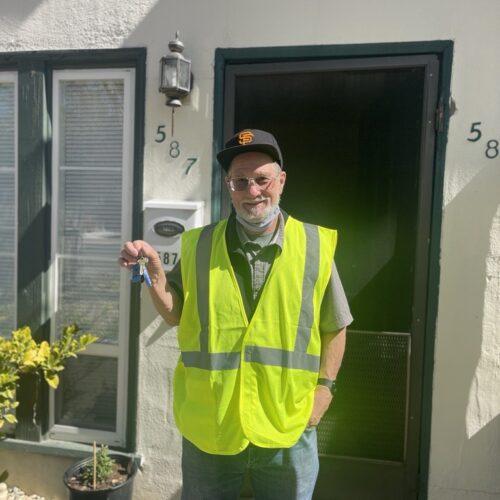
Working with the staff at LifeMoves provided the foundation he needed to take
the crucial next steps to change his life. The organization offered him more than just a place to stay—the team provided him with a sense of stability and support that he had not experienced in years. With their assistance, he took advantage of the tools and
resources necessary to rebuild his life. "I am very grateful for what the organization has done for me," comments Douglas.
During his journey, he worked with an employment specialist with the Re-entry
program to build a resume and learn interviewing skills, resulting in Douglas successfully finding employment. He also completed the savings and subsidy program.
Guided by his case manager, Christina, Douglas navigated the complexities of
securing housing with newfound determination. Through their partnership, he could confront life's uncertainties with resilience and adaptability. "If you expect life to be a certain way, you're in trouble," Douglas reflected, acknowledging the invaluable lesson
he learned along his journey.
Today, Douglas is a beacon of hope for others facing similar challenges. His
story serves as a reminder that, no matter the obstacles we face, we can overcome adversity and rebuild our lives with the proper support and perseverance.
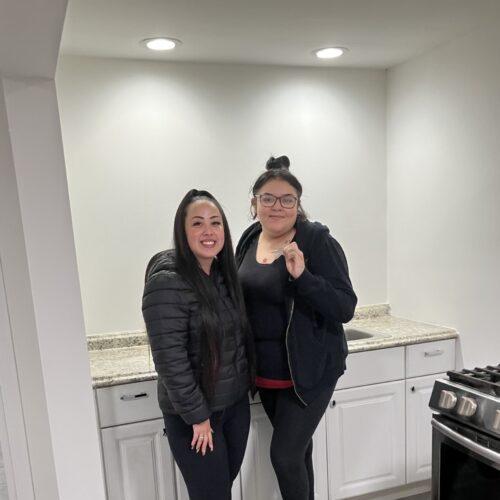
She immediately reached out for assistance from the Fair Oaks Community Center where they found support to move into two hotel rooms. In January they moved into the LifeMoves First Step for Families site in San Mateo.
“It was a complete blessing,” Ady said. “My two-year-old was so excited to move from a hotel to a house again, and I was happy that our family of seven had its own space. There were days I couldn’t afford diapers or have time to prepare food. The staff supported us with everything. We were safe and had everything we needed so I could focus on finding a job and a home.”
From the start, Ady worked closely with her LifeMoves case managers to take advantage of the services LifeMoves provides, including onsite childcare, therapy and credit repair.
“Therapy was really important,” Ady said. “I thought that going to the shelter was the end. It hit me hard and the support I received made me realize I didn’t have to give up.”
By July Ady was employed as a financial bookkeeper at a tech company. One day at work, her LifeMoves case manager Marissa Patterson gave her a call to tell her she was accepted into the Rapid Rehousing program.
The Rapid Rehousing program provides 12 months of tiered rental assistance and services to help clients find and move into housing and increase their self-sufficiency, so they stay housed. The county qualifies clients based on several requirements, including current employment.
LifeMoves Rapid Rehousing case managers like Marissa, have 60 days after qualification to work with their clients to find housing, provide move in support and serve as an advocate with landlords. They continue to support the client in the year afterwards.
“We are here to teach and support, but the client does the real work. In Ady’s case, she was on it from the beginning. She ran into a challenge with her first application because of her previous eviction. She applied to two other apartments but was unsuccessful. I finally found something on Craig’s list. Ady was resilient from the beginning,” said Marissa.
Marissa went to the landlord to explain how the subsidy works and advocated for Ady. She shared financial information, as well as the case management support that would be provided to Ady for an entire year.
The support that comes after getting housed is important. It is designed to stabilize and keep people housed. Case managers and their clients have 1:1s each week, meet in person twice a month and work together to monitor and revise savings plans. Career goals and overall support plans are also part of the discussion.
Ady was told the apartment was hers the day she went to view it. “I burst into tears on the way to the car. I kept thinking, this is it. I finally have a place to call home,” she said.
Ady is now focused on her job, building her savings, and enjoying her new space.
“I’ve never had a place on my own and I’m finding myself,” she said. “LifeMoves and my case managers were here for me and never gave up on me. They showed me I could be successful on my own.”
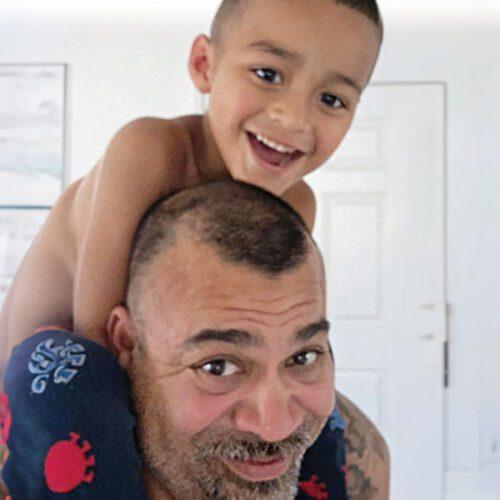
Carlos served two tours in Iraq, risking his life to serve his country. When he returned home, he found himself struggling with mental health issues. With nowhere to turn, Carlos and his son became unhoused. When the VA referred him to LifeMoves The Villa, Carlos and his son received interim housing and wrap-around services that gave them much-needed stability and support as they navigated their way back to a life of self-sufficiency.
With this support, Carlos secured two jobs — working for the railroad and as a security guard. With his case manager’s help, Carlos secured a VA Supportive Housing voucher and moved into a two-bedroom home. But more challenges lay ahead. Carlos wanted to open a bank account and improve his credit score of 560. Carlos raised his credit score to 640 in just three months – a testament to his desire to rebuild his and his son’s lives.
Carlos also worked closely with LifeMoves to ensure his son’s special needs were met. From enrolling him in Head Start to accessing additional academic assistance, Carlos was tenacious in securing the best opportunities for his child. Carlos and his son graduated from The Villa program. Their story is a reminder that even in the face of overwhelming challenges, help, hope, and hard work can light the path to a better future.
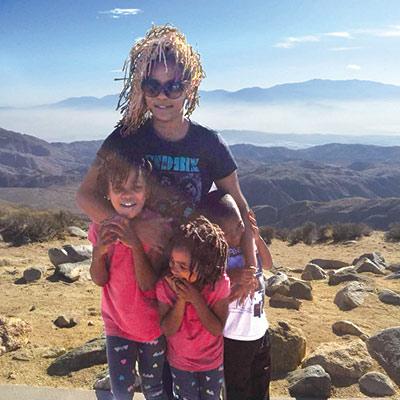
When Laura’s 20-year marriage suddenly dissolved, she was left with four children, no income, and no place to call home. She contacted the Veterans Case Manager at Haven Family House. LifeMoves immediately offered a unit at Haven Family House. Laura drove overnight from Palm Desert to Menlo Park for an intake the next morning.
Without delay, she connected with the VA HUD-Veterans Affairs Supportive Housing (VASH) team for a housing voucher and scheduled job interviews. She was quickly hired as a Supervisory Nurse at El Camino Hospital in Mountain View, with a starting salary that gives her family financial stability. The VA HUD VASH team expedited her housing request. Two weeks later, Laura and her children moved into their new home in San Jose.
Laura leveraged a partnership with LifeMoves to amplify her gifts, talents, resilience, and determination along her path to secure full-time employment and a safe, permanent home. Not only is Laura housed, but she is also a newly appointed member of the LifeMoves Board, bringing the power of her lived experiences to inform our approach.
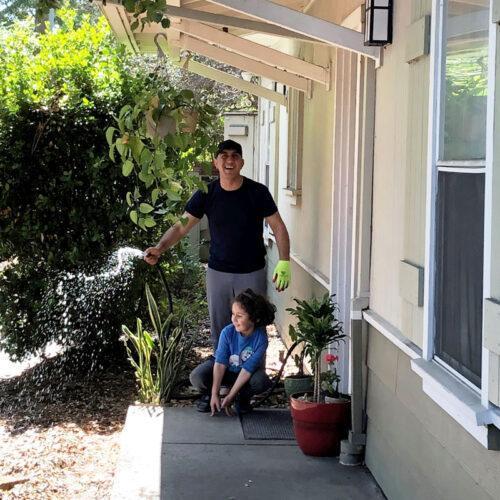
They rented a home in South San Francisco, where Adel started a limousine service working out of San Francisco International Airport. He saw immediate success and rapidly grew his business, adding staff and vehicles to his fleet.
In 2015, Adel and Fatima were thrilled to welcome their first child, a son named Yussaf. With a thriving business and happy family, Adel was confident that this is where he would stay, raise his son, and grow old with his wife.
Suddenly, COVID-19 hit, and with nobody traveling, Adel rapidly lost customers. “It was a really tough time,” he recalls. “There was no business, no money coming in.” Adel was forced to close his business that he’d spent 9 years building from the ground-up. Shortly after, the family lost their home.
“[My wife and I], we both come from big families. I’d never been homeless before. I lived in the same place for 11 years, so it was hard. It was hard just thinking about it, where to go, what’s next…it felt like every door was locked.”
The family was able to stay with friends for a few weeks, but Adel knew they needed their own space. By a stroke of luck, a friend mentioned that the San Francisco Veterans Affairs may be able to offer assistance, and Adel called right away. Craig, Case Manager at LifeMoves, received the call. He heard Adel’s story, took down all his information, and just days later, Craig reached out to share that a private, 1-bedroom unit was available at LifeMoves | Haven Family House. The family arrived at LifeMoves in April 2020.
Adel remembers the feeling of relief as they settled into their new space: “Being here [at Haven Family House], I say [my] thanks every day. Every time I wake up, I feel good, and I know my family is safe.”
Adel quickly got to know Craig and the rest of the LifeMoves team at Haven. Staff always knew where to find him around the site, picking up trash, potting plants outside his family’s unit, or offering a helping hand. Adel persistently followed his case plan, working one-on-one with Craig to search for employment and apply for housing vouchers.
“Every time I see [Craig], I think, ‘it’s all good.’ That’s how it is. ‘Anything you need,’ he says. Even if there’s nothing, he knocks on my door to say, ‘hey Adel. How are you doing? How’s your son?”
5-year-old Yussaf attended online classes with his fellow kindergarteners, and Adel and Fatima enjoyed getting to know their neighbors, especially other Veterans and their families. “It’s a haven, this place – it’s the right name for it. It feels like home, basically. I get up every morning; I clean up around the area, I pick up any trash. It’s a good push to the next life.
When I move, I’m going to look at everything differently.”
As his family established a routine, Adel had more time to continue looking for work. He diligently saved his money, and with Craig’s help, he was able to secure a housing voucher through the VA Supportive Housing Program.
Adel and his family were overjoyed to find a beautiful home of their own – a cozy apartment in Mountain View where they even have a backyard to enjoy. The family moved to the apartment in December and Yussaf is enrolled in a local school.
Reflecting on a tumultuous year, Adel stresses how important it is never to give up: “[Being homeless], it’s a very scary thing. I tell everyone, ‘if that happens to you, just do not lose hope.’ Before, I had money – I never thought I’d be homeless, but no. Be humble in life, be nice, and appreciate it.”
Despite losing his business and his home of over a decade, Adel never lost his spirit. As the LifeMoves team can attest to, he is incredibly warm, constantly expressing his gratitude and appreciation for others, and never fails to greet a passing neighbor with, “hello, my friend.”
Adel also expressed his desire to give back to the LifeMoves community, “Anytime, anything, you just call me — I’ll be the first one; put my name up, anything, I’ll volunteer.”
Still as hard a worker as ever, Adel continues looking for long-term work to ensure his family’s security in their new home. From 8 AM to 11 PM, he drives for Uber but unfortunately, passengers are few and far between.
“My plans for the future...I’m going to be happy, that’s the first thing. I’m going to stay happy; I’m going to stay positive. I’m going to look for work. If I could help anybody not to go through it, I’ll help.”
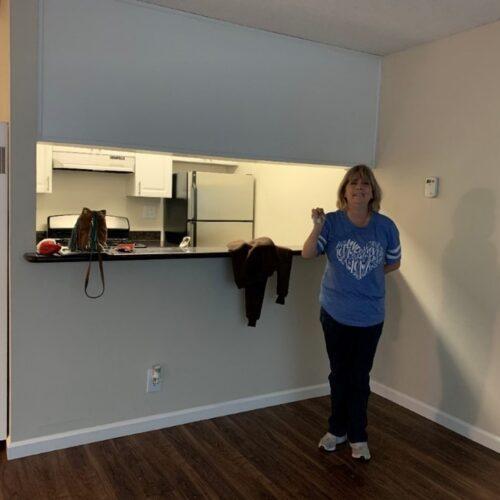
Before coming to LifeMoves, Alice had been living unhoused for almost twelve years. She lived in a studio and supported herself for decades in Half Moon Bay, but after losing her job in 2008, she could no longer afford rent and was forced to move out – to the streets.
Alice received a referral from the COVID Relief Program and came to LifeMoves Coast House after the program opened in 2021. From the start, she was proactive in working with her case manager, utilizing all the programs and benefits offered, and creating relationships and a positive, supportive environment with her peers and fellow residents.
With a lot of hard work and help from her case manager, Alice saved her money and found the perfect apartment for herself. She received a housing voucher and, in October 2021, moved into her own place in Pacifica. After 13 years, Alice lives and works again on the coast, and she is hopeful for her bright new chapter.
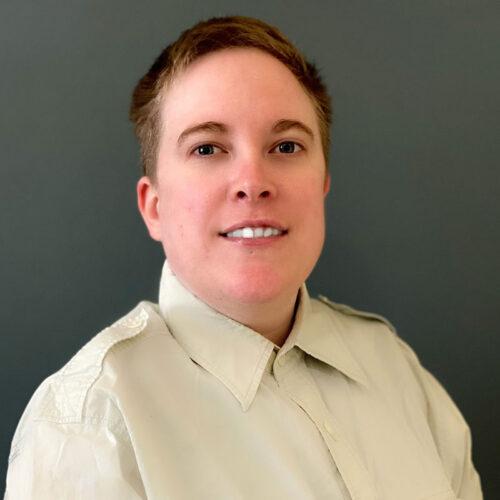
I had an episode (a symptom of my Bipolar disorder) along with not feeling safe and feared for my life. Right before, my dad was hospitalized. Everything dropped on my shoulders. I had to make sure the house was clean, that there was room for everything, and I was taking care of my dad’s medicine, my medicine, and my younger brother’s medicine all at the same time. I was over-stressing, and I didn’t know how to take the stress level from a high peak down to where I could calm down and say, ‘Look, I need to take a step back.’ But I was just so worried. I lost my mom at an early age, and it was really hard seeing my dad go in and out of the hospital.
I went from one hospital to another in Fremont. Then I found New Haven Inn. My case manager helped get me into a group called Project Hire that will help me with getting employment. I want to find work that’s in a house like [New Haven].
I’m usually pretty happy and optimistic. I’ve had my bad days. When I have my down moments, people are shocked and it’s like, yeah, I’m human. But when I was having a hard time I was allowed to come to [the staff] and tell them what was going on. There was a student therapist that worked here – they helped me realize some aspects of myself that I didn’t even know. I felt really at home talking and opening up to them.
I felt more at home at a shelter than I did at my own house.
[My family and I] are on good terms now, and I’ll be heading back there next month. They’re really excited to have me, and they’re trying – they’re trying to call me what I want to be called. And that took a lot of courage for them, too. It’s been a trial and half, but my family, even if they don’t understand, they support me.
Everything just kind of falls into place. I got a Peer to Peer certificate with NAMI, I have a newfound love for the Niners, I have a biography I’m writing and another fiction story, and I feel a lot more confident in myself and my ability to do things. Time just tells you that things can heal.
If you ever need a safe place to be, New Haven Inn is a great environment, and the staff really push you to thrive. And they’re just good. Good-hearted people trying to make it better for people like me, and I really appreciate it.”
– Chris, New Haven Inn client: Jan 2020 – May 2020
* LifeMoves | New Haven Inn, the second LGBTQ+ shelter in the nation, provides temporary shelter in an accepting, safe, and supportive environment along with therapeutic case management to help unhoused members of the LGBTQ+ community to a stable home. Our work is made possible thanks to our many generous partners, including Bank of America.
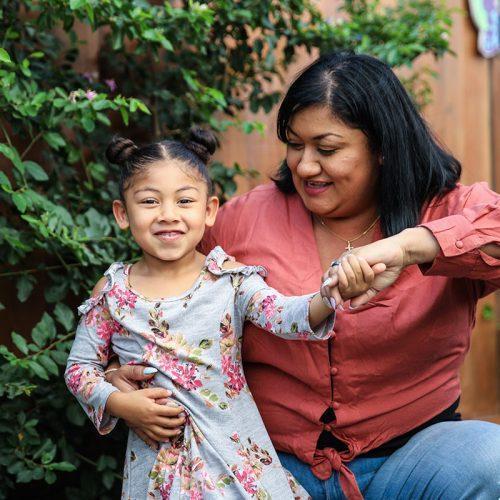
Crisanta worked hard to support Mia and give her a joy-filled childhood, but Crisanta was struggling with addiction and depression. When building tensions at home finally came to a head, she made the difficult decision to move out, temporarily leaving Mia in the safety and comfort of her extended family.
But the separation from her daughter only compounded her mental health struggles and built a strong desire to ease that pain. Unable to balance her two jobs, she ended up living out of her car for six months. During that time, she was able to visit with Mia during the day, but Crisanta quickly saw that this wasn’t sustainable. She was suffering in the absence of her daughter, and she wanted to build a secure, happy, and stable life for them together.
Initially, Crisanta had doubts about going to a shelter – she had never stayed in one before – but the visits with her daughter reignited her sense of purpose, pushing her to find the best place where they could both stay. In July 2020 Crisanta and Mia arrived at LifeMoves | First Step For Families.
With the warm welcome and support of LifeMoves staff, they quickly settled into a routine, making grocery trips, following COVID-19 safety protocol, and spending time outside whenever possible.
“This was somewhere where I could restart, regroup, [rethink] things and push forward,” Crisanta recalled thinking during her first months at First Step. “It’s hard and lonely sometimes, […but] it really feels like you’re around people who are in the same boat as you and there’s no one here to judge – it makes you feel welcome.”
Crisanta and her case manager check in regularly, reviewing housing logs and job openings, as well as communicating about her mental health and wellbeing. Meanwhile, 4-year-old Mia enjoys playing with the other children at First Step For Families, working on projects with the children’s services coordinators, and zipping around her room during remote activities like virtual dance classes.
In October, Crisanta and Mia joined other families staying at the site for a socially distanced outdoor Halloween celebration (including a full on-site pumpkin patch) hosted by LifeMoves staff. Mia picked a bumble bee costume from the site’s closet of brand-new outfits, and she buzzed around from station to station while Crisanta carved a pumpkin and mingled with her fellow parents.
She made incredible progress to overcome what once felt like insurmountable challenges, but Crisanta is still working towards her biggest goal: giving Mia a home to call their own. She misses her family, especially her mother, and Mia wants to see her grandmother and cousin more regularly.
During her time at LifeMoves, Crisanta has been able to save her money, which will allow her to eventually afford her own place. Equally as important, she has found a renewed sense of self, built confidence in her abilities and her position as a role model and caretaker for her daughter, and fostered her own personal and professional passions to pursue.
While she prepares Mia to start preschool, Crisanta is attending classes of her own so she can finish her GED. Her long-term goals include owning and operating her own boutique, residing permanently in her hometown of San Mateo, and connecting regularly with her mother and family again. Motivated by her own progress and having her daughter at her side, Crisanta knows that they will only continue to rebuild and find their way back to a life full of hope, support, and love.
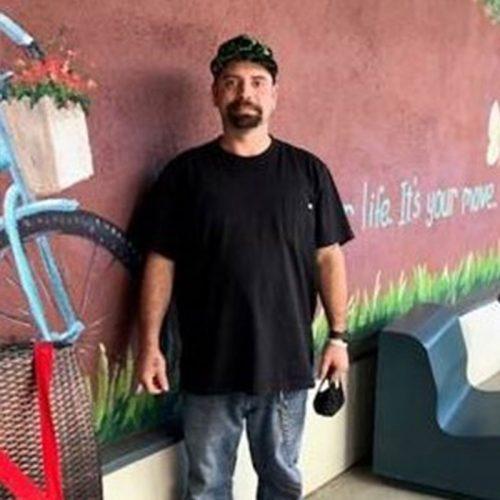
Since he was 19 years old, Jeff struggled with drug use and his deteriorating mental health, experiencing symptoms of anxiety and depression but never seeking treatment. He lived at home with his parents, but eventually, tensions came to a head, and Jeff’s parents wouldn’t allow him to live there anymore. “I was doing drugs. My family didn’t want me at the house, so they kicked me out, and I never went back.”
That moment was a catalyst for the next 20 years. Jeff succumbed to his addiction and made increasingly self-destructive choices, spending time in and out of prison. But after almost two decades without a home or job, Jeff resolved to change his course. His probation officer referred him to LifeMoves and, in May 2020, Jeff moved into Julian Street Inn (JSI).
“Jeff came to JSI with a negative self-image. His entire identity was shaped around his background, his criminal record, his addiction, and just general dissatisfaction for the world and how he exists in it,” Fannie, Case Manager at LifeMoves, recalled.
The transition to staying in a shelter was difficult, but Jeff was determined to improve his life. He diligently followed his case plan, applying for any job listings he found and saving his money. While he met some suggestions with resistance and frequently got discouraged, Fannie responded with patience and firm encouragement.
“Fannie and I butted heads; we’re both stubborn. But she called me out on stuff, and it did help.”
Despite setting aside a considerable amount of money and showing progress in his return to stability, Jeff had doubts about whether he was ready to support himself. “It was challenging because I suffer from anxiety and depression, fear of the unknown. I didn’t want to leave JSI until I knew I had a stable, permanent job.”
He attended therapy and leaned on staff for support. Jeff became close friends with one of his dorm mates who, after starting a new job himself, referred Jeff to the same company. Jeff started as a temp making n95 masks, and, after six months of hard work, he was hired full-time.
Having saved close to $3,000 and confident in his stable employment, Jeff moved out of JSI in January 2021 and into a shared room in a sober living environment in Santa Clara. He has been sober since May 2018, and he remains grateful for his job, continued friendship, and time at JSI.
“Just being productive really helped,” Jeff shares. “[Fannie] got me to do the things I needed to do and helped me become a better person – it means a lot to me.”
Jeff looks forward to his independence, spending time with his girlfriend, and moving into his own place soon. He reflects on his more than 20-year journey: “Homelessness isn’t the end; there’s always a way to get out of a situation if you put the work in. [LifeMoves] helped me so I wasn’t stuck in the same rut I was in before. It’s always possible to move forward.”
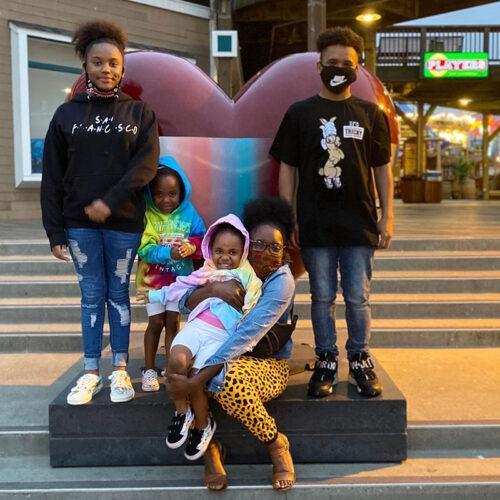
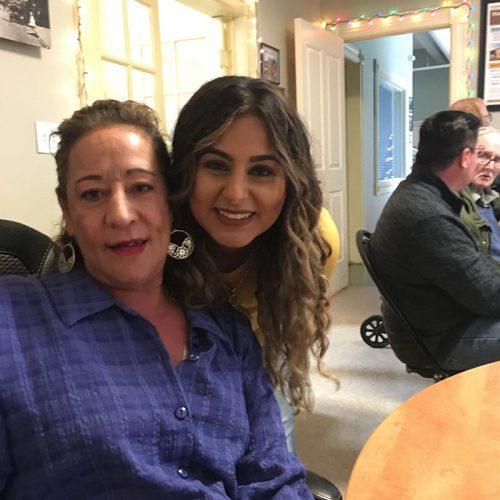
Lisa began to rely more and more on alcohol and she suddenly found herself alone and without a home – even her mother who lived close by in Burlingame wouldn’t speak to her due to Lisa’s struggles with alcohol. Eventually, she moved into a shuttle bus which she parked in front of a friend’s warehouse.
After 1.5 years, Lisa again found herself without a home – the warehouse owner couldn’t afford the rising rent and her shuttle bus was immobile. She gathered the last of her life savings and her aging dog Molly and purchased an RV where she would spend the next 2 years of her life.
“I lived in my motorhome on the street – no electricity, no water, and I would just imagine how having a home would feel. My dog was getting old and I wanted her to have a comfortable place as she got older.”
Finally, good fortune and hope struck. Lisa bumped into LifeMoves Case Manager Victoria Asfour who was meeting clients at St. Vincent de Paul during breakfast service. Lisa was exhausted and knew she was finally ready to put in the hard work needed to secure housing.
“I said to myself - Lisa, let’s flip the script. Let’s try something different because this isn’t working.”
Lisa was extremely committed – she met with Victoria twice a week to search for housing, create budgets, and fill out rental applications. She had a strong desire to give back to her community and spent time doing art projects with children who would volunteer at LifeMoves | Vendome. Due to her frequent walks with Molly, Lisa quickly realized that there were many apartments for rent that weren’t visible online – only advertised via signs in front of the building. Victoria and Lisa started driving through neighborhoods, writing down phone numbers from “for rent” signs and tirelessly calling landlords.
“Vickie just didn’t give up. She was right here and held me responsible. I needed that discipline and it felt good. I needed a schedule.”
After only a few short months of working with Victoria, Lisa received the keys to her own one-bedroom apartment. While overwhelmed at first, the weight of living on the street and constant worry slowly faded away and was replaced by a sense of security and peaceful, purposeful days.
I’m artsy – I’m into crafts and arts. I paint. I’m very creative and my dog keeps me busy, I walk her every 2 hours or so as she’s getting older. I’m able to accomplish things every day. Right now, I’m into painting chairs. I’m proud of them! I didn’t know I had that artistic skill because I didn’t have the opportunity.
It’s been two years since she moved out of her RV and into her apartment. She’s organized, she has bank accounts, she has electricity and running water. Lisa now makes sure to accomplish something every day, whether that be exploring her newfound artistic side, taking care of her aging dog, or seeing a friend, she enjoys having a sense of routine and a sense of purpose.
“Every day I wake up grateful that it could be done. I was the last person that I’d thought could have anything to put a smile on my face for. All these years out there in the street, I always thought “me, it’s not going to happen.” But you know what? It did. It changed my whole world around. I have a smile on my face every day, I won the lottery – that’s what it feels like. If you want it bad enough, you can do it. I am so grateful.”
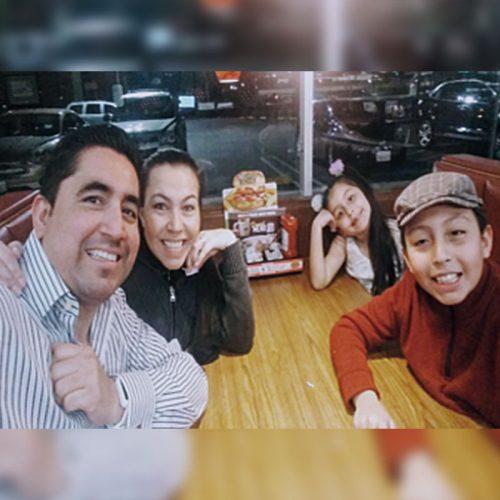
Yenny and her husband have always worked hard to support their family. But when they moved to California, they found it difficult to pay for a place to stay. They rented a hotel room at first, but they eventually ran out of money and the family had to start sleeping in and living out of their car.
Eventually, they were referred to LifeMoves, where the whole family quickly got to work. Yenny worked diligently with her case manager, she and her husband applied for work and started new jobs, and their children resumed schooling.
Then COVID-19 hit. Yenny recalled the devastating impact on her family: “My kids couldn’t go to school anymore, and my hours at my job got reduced. I no longer had anyone to take care of my kids. My husband also lost his job.”
But they never gave up – Yenny’s husband immediately began searching for a new job. He quickly found stable employment, allowing the family to save enough money to move into their own home.
They now live in Hayward, where Yenny is happy to be home taking care of the kids and supporting their studies. The family is taking this new experience one day at a time, building little by little, with hope, courage, and a lot of hard work for their new chapter.
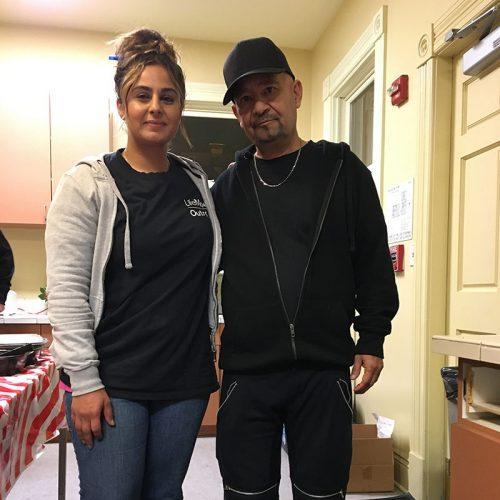
But in 2003, a tragic work accident left him permanently disabled. His neck was severely injured, third and fifth vertebrae crushed, and his hip broken. Ronald gradually regained mobility, but the emotional and psychological impacts remained. He stopped working, left his home, and fell deep into drinking.
Ronald started traveling to Reno, staying night-to-night in hotels, drinking, and partying. The days became a blur – "that's the point I can't remember," Ronald admits. "I didn't have my own place for about four years." He found himself back in the Bay Area, riding the bus around local neighborhoods and catching sleep when he could. His drinking had become intense and debilitating.
Then Ronald met Victoria (Vickie) Asfour, Case Manager at LifeMoves (now Program Director of the Homeless Outreach Team). She introduced herself and gave him her business card.
"I put it in my pocket and left it for five months or so," he admits. "Then one day I decided, I got tired of the way I was living. So, I called [Vickie], and everything started changing."
With Vickie's help, Ronald started Alcoholics Anonymous. He attended meetings, saw Vickie regularly, and made great progress. But his path to healing, improvement, and self-sufficiency was far from easy.
"Vickie knew I was drinking when I stopped showing up and started making excuses. She would just drive around, find me in bad condition and say, 'I think it's detox time.'"
Heavy alcohol intake took its toll on Ronald's body. "I was drinking myself to death. I was drinking holes in my stomach, and I started throwing up blood. [Vickie] found me one day, and she rushed me to the hospital."
"She saved my life. The doctor said that had I been out there for another week, I'd be dead."
After he was released from the hospital, Ronald resolved to get back on track, prioritize his health, and quit drinking. With determination and hard work, Ronald got sober, and saw both his physical and mental health improve. Vickie invited him to events at LifeMoves | Vendome where he reconnected with old friends and befriended the Vendome staff.
"I had a couple of friends that were living in the [Vendome]," Ronald shares. "We're all doing well – that's what's so good about it. We all hung out together on the street, and we all turned our lives around."
Ronald managed to save enough money to afford a place of his own, and, with Vickie's help searching and applying for housing, Ronald finally moved into his own apartment in South San Francisco.
In December 2020, Ronald celebrated his two-year anniversary of being stably housed.
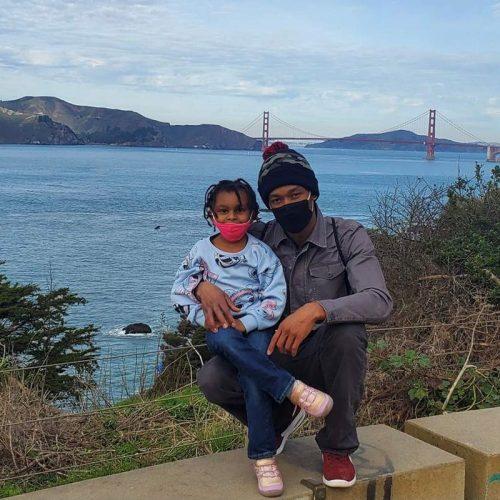
But his life, stability, and certainty for the future were upended after a workplace injury in 2018. Even after he recovered, medical restrictions prevented Lyvell from returning to his position, and it was challenging to find a more suitable role within his organization. The process continued unresolved for months.
"I had to depend on the money I had saved, but I fell behind on my finances due to the fact that I couldn't work and had an unresolved workers' compensation case. Essentially, I was put on hold."
After losing their home, Lyvell and Lyric initially stayed with family, but the compounding stress of a pandemic, sheltering together, caring for his daughter, and getting back on his feet strained these relationships. He and Lyric moved into a hotel, but Lyvell knew that he needed to find a more suitable environment for his daughter – at this point, his savings were almost fully depleted.
He called local helplines, but quickly found out that as a single father, many programs wouldn't allow his daughter to stay with him. Determined to stay together, Lyvell kept trying – and in October 2020, he and Lyric found LifeMoves | Redwood Family House.
"It came right on time," Lyvell says of the referral to LifeMoves. "I felt like I wasn't going to have anything to give my daughter in terms of shelter or food. We didn't have any options, so [LifeMoves] was a lifesaver."
He and his case manager, Miguel, came up with a plan to work toward regaining self-sufficiency. "I needed some kind of foundation – a routine – and [Miguel] helped me get started." They went through a housing plan and steps to financial security, which provided useful, applicable knowledge for Lyvell while continuing his employment search and settlement of the workers' compensation case.
Lyvell loved spending time with Lyric when he wasn't working towards his goals – watching her grow and participating in the virtual activities that LifeMoves provides to parents and their children.
After months of hard work, rebuilding his confidence, saving his money, and caring for his daughter, Lyvell was able to afford a place for his tight-knit family of two. They now live comfortably in Hayward, and 4-year-old Lyric will start kindergarten this year.
Lyvell accepted a new role at his organization, but due to COVID-19, the start date was postponed. In the meantime, Lyvell is attending a class to access work-study opportunities and build his resume.
"We were experiencing homelessness for about a year. After a while of going between family's homes, being out on the street, sleeping in vans and hotel rooms – it feels really good finally being here in our own home."
”Being here at LifeMoves, I've never felt more secure and in place with my life... even though I have rules and a case plan, I feel like I'm running my own show and marching towards what I want.
Crisanta
”Being here at LifeMoves, I've never felt more secure and in place with my life... even though I have rules and a case plan, I feel like I'm running my own show and marching towards what I want.
Crisanta
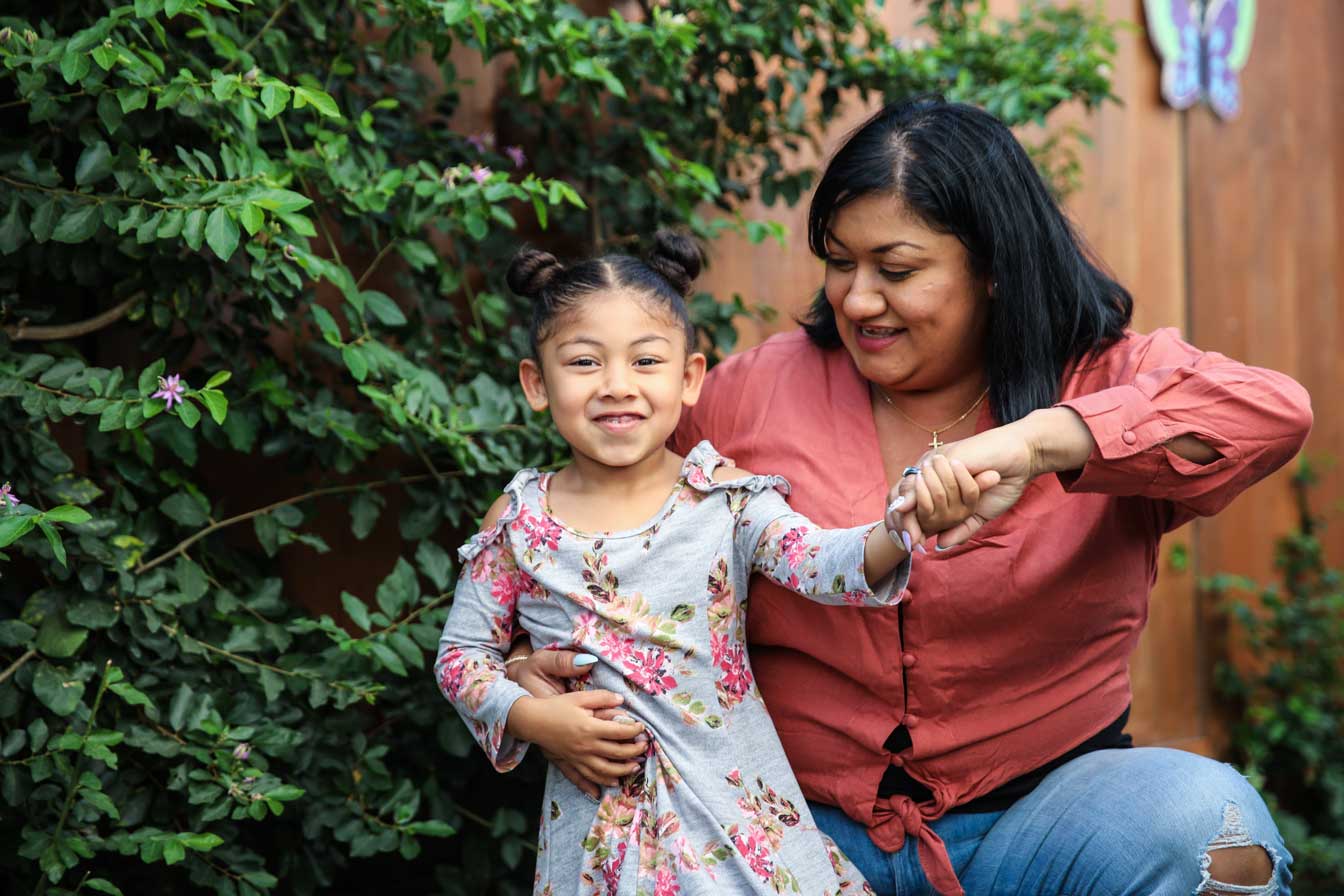
Stay Connected!
Receive stories of hope and transformation from LifeMoves.
By joining our list, you agree to receive informative emails and mailings about LifeMoves.


